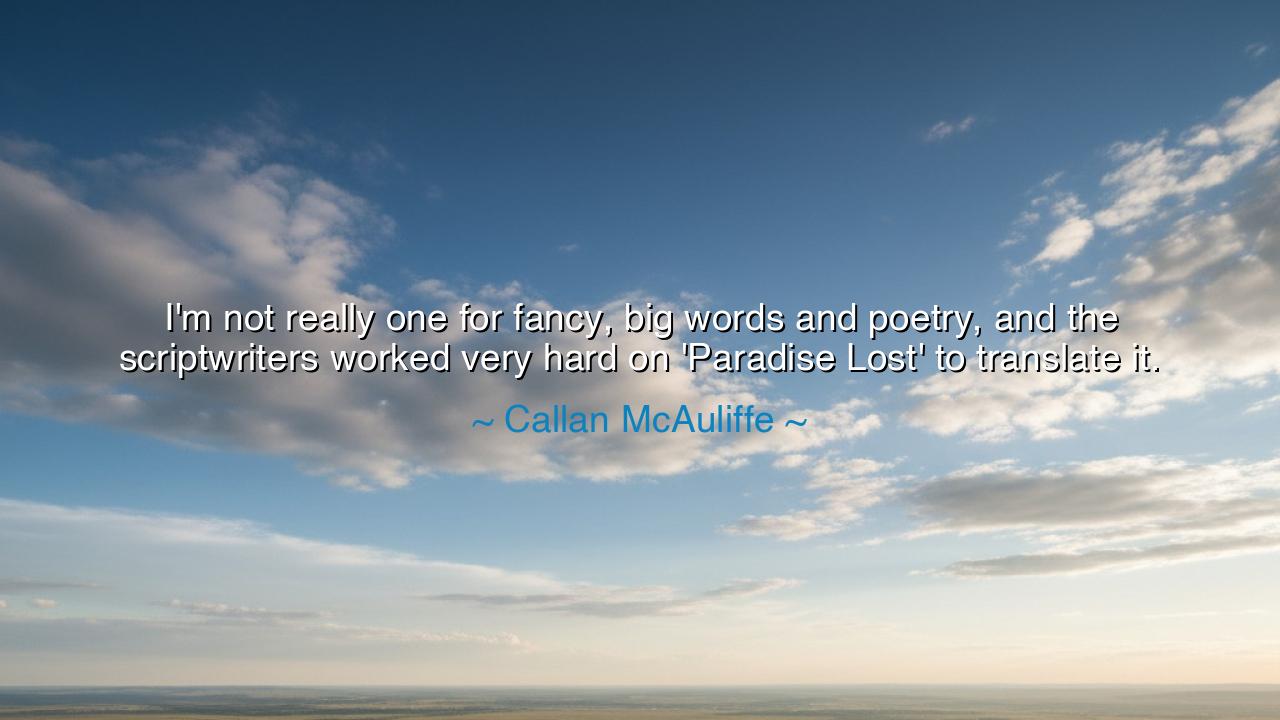
I'm not really one for fancy, big words and poetry, and the
I'm not really one for fancy, big words and poetry, and the scriptwriters worked very hard on 'Paradise Lost' to translate it.






Hear, O seekers of truth and simplicity, the words of Callan McAuliffe, who confessed with honesty: “I’m not really one for fancy, big words and poetry, and the scriptwriters worked very hard on Paradise Lost to translate it.” In this utterance lies a lesson that transcends art and speech: that the heart of wisdom is not always clothed in grand or elaborate expression, but in clarity that reaches the soul. Words may be adorned with majesty, yet if they do not touch the listener, they are like jewels locked away in a chest, unseen and unused.
The meaning of this teaching is that language, whether lofty or simple, must serve a greater purpose: understanding. McAuliffe admits that he is not given to “fancy, big words,” yet in this humility lies a noble truth—that communication is not about self-glory but about connection. To “translate” the grandeur of Milton’s Paradise Lost into something graspable is not a diminishment but a gift, for words that are too far above the people risk leaving them in silence. True wisdom lies not in display but in making the profound accessible.
The origin of these words lies in the actor’s experience with Paradise Lost, a tale written by John Milton in towering language, brimming with complex theology and poetic grandeur. While the work is immortal, its words often stand as a barrier to the uninitiated. McAuliffe recognized that it was the labor of the scriptwriters to bridge that gap, to translate the sublime into the comprehensible, so that its truth could be experienced not only by scholars but by all. This is an ancient task: the bringing of fire from the heavens down to earth for mankind.
Consider the story of Socrates, who, though wise among men, spoke not in riddles of the academy but in simple questions that anyone could answer. He avoided “fancy words,” and instead used plain speech to awaken the truth already dwelling in the minds of his students. Though no poet, he was the midwife of wisdom, bringing forth clarity where confusion reigned. His life proves that simplicity does not weaken truth—it strengthens it, for it makes it live in the hearts of the people.
Think also of Abraham Lincoln, who in his Gettysburg Address used no long-winded grandeur, but simple, direct language: “government of the people, by the people, for the people.” These were no big words, yet they burned brighter than many tomes of eloquence. They translated the sorrow of a battlefield and the hope of a nation into speech every farmer and soldier could carry in his heart. In his simplicity, Lincoln was more poetic than all the poets.
O children of tomorrow, learn this: words are not for ornament but for illumination. Do not fear simplicity, nor despise those who lack love for the grandiose. Rather, measure speech by its power to move hearts, to awaken minds, to inspire action. For it is better to speak one sentence clearly understood than to weave a tapestry of words that leaves others bewildered. True poetry is not always found in form but in the fire it kindles in the soul.
Practical wisdom calls you: when you speak or write, ask not, “Is this impressive?” but rather, “Is this understood?” Do not pursue grandeur for its own sake, but seek to translate the deep truths you carry into language others can grasp. Practice simplicity, and clothe great ideas in words that are clear. In doing so, you honor both the wisdom itself and those who receive it.
Therefore, remember the counsel hidden in Callan McAuliffe’s confession: grand words may impress, but translated truth transforms. Seek clarity, not vanity. For the highest speech is not that which dazzles but that which enlightens. And the one who makes truth simple gives a greater gift than the one who makes it ornate, for he ensures that wisdom does not remain imprisoned in books, but lives in the hearts of all who hear it.
––






MTdo minh thanh
This comment feels refreshingly down-to-earth. It reminds me that not everyone has the same relationship with literature or lofty language, even in creative industries. I’m curious, though—how do scriptwriters manage to ‘translate’ something like Milton’s writing, which is full of symbolism and rhythm? Can visual storytelling capture the same grandeur that poetry does with words? It’s fascinating how each medium has its own way of expressing timeless ideas.
NHNguyen Ha
I like how honest this quote is—it shows that not everyone relates to poetry or complex language, and that’s okay. But it also makes me wonder about the balance between authenticity and accessibility. Should creators prioritize staying true to the original text or making it understandable for wider audiences? Maybe the real art lies in translating big ideas into language that still feels beautiful and meaningful without losing their essence.
Hhanei
This statement makes me think about how language can both connect and exclude people. Not everyone enjoys or understands poetic writing, but that doesn’t mean they can’t appreciate the ideas behind it. Maybe adapting works like 'Paradise Lost' is a way of keeping them alive for new generations. Still, do you think simplifying language risks watering down the emotional or intellectual power of the original work?
VNHoang Viet Nam
I find this quote interesting because it touches on the challenge of making classical or complex works accessible to modern audiences. It raises the question—should art always be translated into simpler terms, or do we lose something essential in the process? 'Paradise Lost' is such a dense, poetic text; I wonder how much of its depth survives when it’s rewritten for contemporary viewers who may not connect with old-fashioned language.